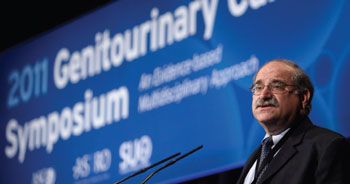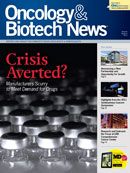Bicalutamide During and After Radiation Improves Progression-Free Survival in Men With Rising PSA Following Primary Surgery for Prostate Cancer
According to primary results of a phase III randomized, placebocontrolled trial reported at the 2011 ASCO Genitourinary Cancers Symposium

According to primary results of a phase III randomized, placebocontrolled trial reported at the 2011 ASCO Genitourinary Cancers Symposium, bicalutamide during and after radiation therapy reduced the risk of progression and the risk of metastatic disease in men with a rising PSA following radical prostatectomy for prostate cancer. The benefits of bicalutamide were evident across subgroups and its addition did not increase toxicity substantially.
The RTOG 9601 study was initiated in the mid-1990s. After a median of 7 years of follow-up, the primary endpoint of overall survival still has not been met, with not enough events, said lead author William Shipley, MD, of Massachusetts General Hospital in Boston. “This study provides proof of principle and it can serve as a cornerstone for other studies,” he noted.
The study included 771 men with a median age of 65 years who had undergone radical prostatectomy and had disease outside the prostate or had positive margins but were lymph nodenegative. Elevated PSA was 4 ng/ mL or below at study entry.
Patients were randomized to arm 1 (ie, radiation therapy of 64.8 Gy plus bicalutamide 150 mg 4 times a day) or arm 2 (ie, the same dose and schedule of radiation therapy plus placebo). Shipley said that at the time the study was designed, bicalutamide was not well understood, and that the 150 mg 4-times-daily dose was selected because the investigators assumed it would be well tolerated.
Participants were stratified at baseline for surgical margins, PSA level after radical prostatectomy, entry level PSA <1.5 or 1.6-4 ng/mL, and neoadjuvant short-term androgen therapy or not.
“Androgen therapy was found to have no benefit and fell by the wayside during the course of the trial,” Shipley said.
At a median follow-up of 7 years, 95% of patients completed treatment as planned. Compliance with daily oral tablets was 84% in the bicalutamide-containing arm and 92% in the placebo arm. PSA failure was defined as post-radical prostatectomy surgical failure with PSA undetermined, or a rise to 4 ng/mL, or a rise in PSA after surgery.
Toxicity was low and similar in both groups. Early gastrointestinal toxicity, presumably related to radiation therapy, was similar between groups. Diarrhea was minimal. Shipley said that the biggest problem with bicalutamide was gynecomastia, which occurred in 89% of the bicalutamidecontaining arm versus 15% in the radiation therapy-plus-placebo arm; 8% of patients in the bicalutamide arm discontinued therapy due to gynecomastia.
Liver toxicity was very low. At the time of follow-up, overall survival was 91% in the experimental arm versus 86% in the placebo arm. Distant metastases were found in 7% of patients in the experimental arm versus 12% of the placebo arm.
Freedom from progression was documented in 57% of patients who had radiation therapy plus bicalutamide versus 40% who had radiation therapy alone, a significant difference favoring bicalutamide (P <.0001). Freedom from progression was superior with bicalutamide across all subgroups, he emphasized.
Shipley said that study had several limitations. The survival benefit is not statistically significant, even with 7 years of follow-up, because of the low number of events. Radiation doses and fields may now be improved compared with when the study was initiated. Radical prostatectomy approaches have been modified as well.




